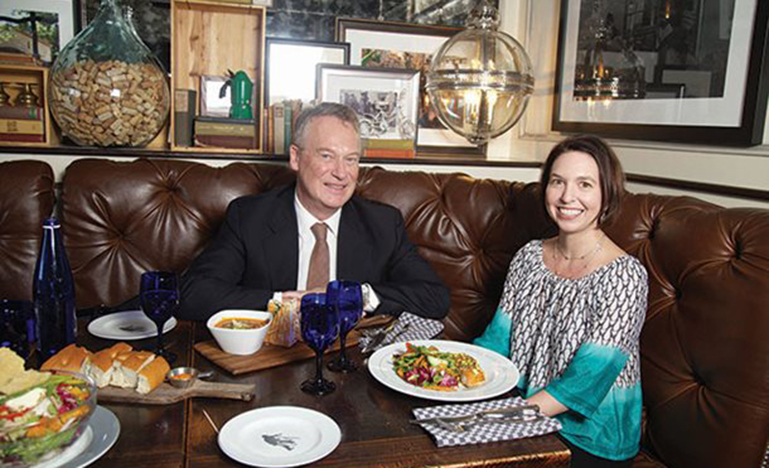Lunch with Bruce Russell and Sarah Dykema: Balancing Act
A flexible workplace makes all the difference.

THE DINERS
The mentor: Bruce Russel, QC, tax ligitator, McInnes Cooper, Halifax.
Background: Russel leads the tax ligitation and dispute department. Je joined the film in 1999 after severals years as a tax ligitator with the federal Department of Justice.
The mentee: Sarah Dykema, senior estate planning and trust associate, McInnes Cooper, Halifax.
Background: Dykema joined the firm a year ago after spending seven years at Stewart McKelvey as a trusts and estates associate and three years as a senior trusts advisor at Royal Trust/ RBC Wealth Management.
Minutes before sitting down for a working lunch at The Bicycle Thief in Halifax, Sarah Dykema received a call from her six-year-old son’s school. Malcolm was sick and needed to be picked up immediately.
This would create major upheaval in many two-parent working households. But it was a minor inconvenience in this case thanks to the structure that Dykema and her husband, Brad, have created to handle such emergencies. In short order, Malcolm was home with dad, who works at home.
Attracted to the prospect of regular hours and predictability, Dykema had left private practice for a senior position at RBC when the couple were about to have their second child. She soon discovered that in many ways, private practice offered more flexibility to combine work and family, an important consideration when devising a structure to support family life.
So when an opportunity arose at McInnes Cooper – a firm where flexibility is a key part of the retention strategy – it was too good to pass up.
“The more I thought about it, I started to feel like it was, in a lot of ways, easier and more flexible to have a family in private practice,” she says. “There’s work to get done but your time is your time. You have freedom to choose to do something in the daytime with your kids, for example, and then do your work at a time that’s better for you.”
Tax litigation partner Bruce Russell knows a few things about juggling work and parenting duties. He and his wife, Mary, always strategized about how to get the most out of family life while maintaining hectic careers. “We’ve both always worked so we hired a nanny to be at the house when the kids [now 27 and 30] were little,” he says.
“But you really need to work as a team with your spouse. [They] have to pick up whatever slack there is with one of you being less available. Sometimes I was less available, but there were times when my wife was less available. A lot of times it became a matter of working after the children were in bed or in the morning before they got up.”
Russell’s commitment to flexibility on the work/home front is shared by his partners who recognized that the traditional way of doing business was costing the firm too much talent.
“We were losing a lot of great young lawyers because the work environment was not as helpful for them as perhaps we could make it,” he admits. “We bring in these really bright lawyers and you invest time and capital in growing a good professional relationship, but then they would leave and we got tired of that. We think we’ve improved in that.”
He was able to carve out enough quality time to coach his daughter’s soccer team and adopt his son’s passion for golf – all while working for one of Atlantic Canada’s biggest firms.
Meanwhile, Dykema is sold on the possibility of finding the elusive work-life balance in private practice. She says she would encourage any woman in law school or just starting out to give it a try.
“When I was going through the process of leaving private practice a few years ago, I had some senior women at my old firm tell me how I would miss flexibility. I wasn’t quite ready to believe it then but now I see there really is room for that balance in private practice.”


